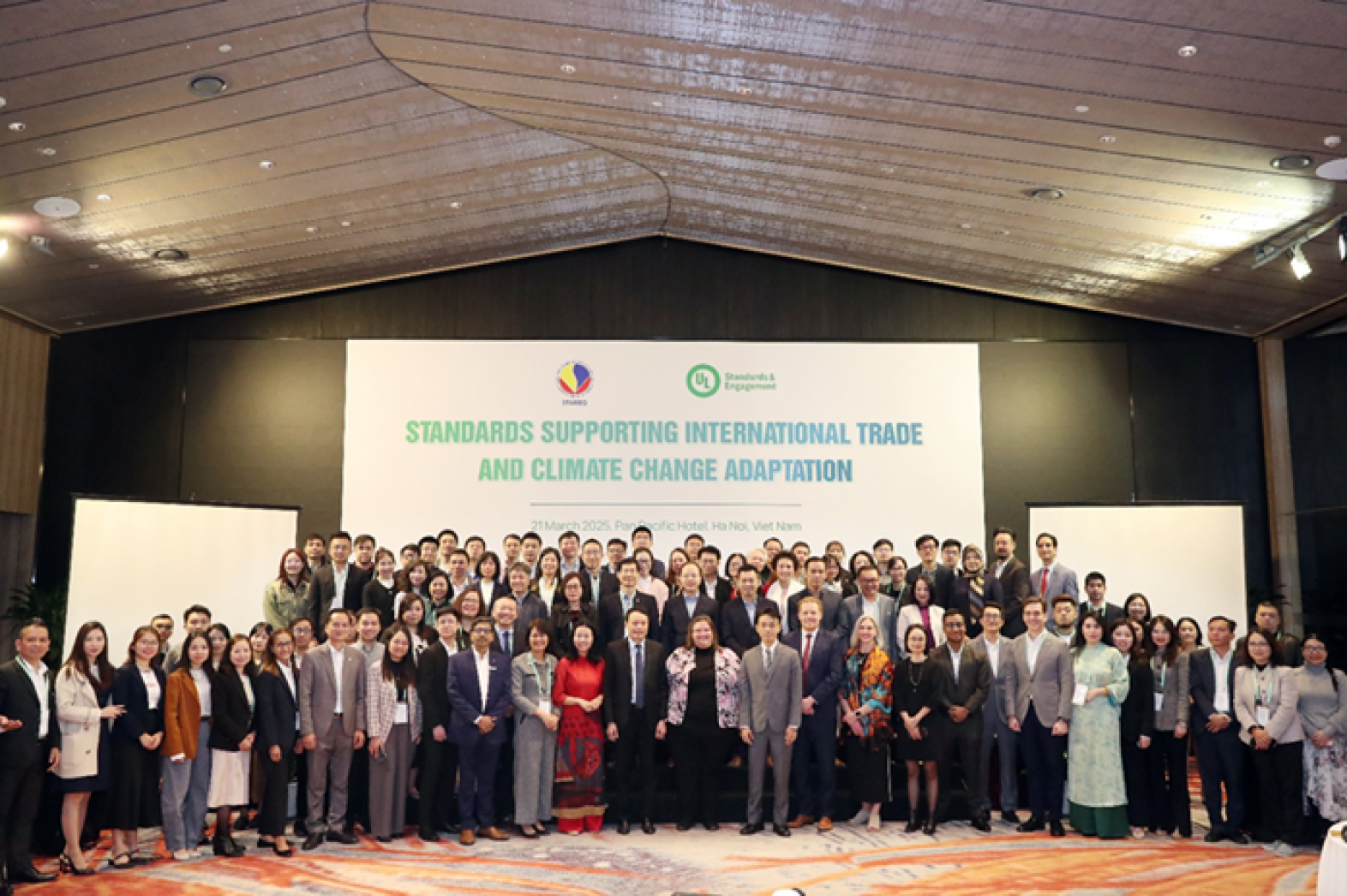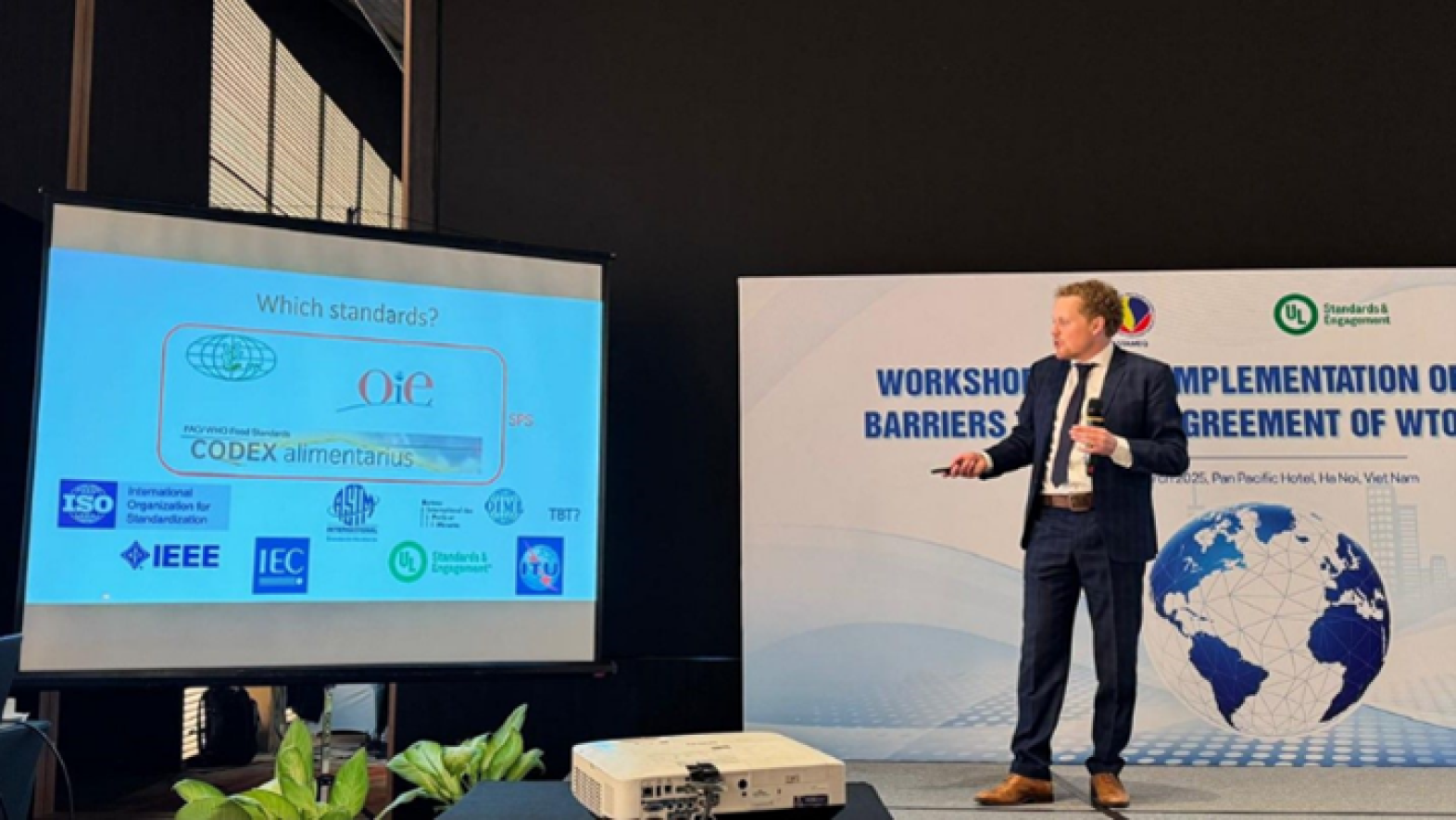In an increasingly interconnected world, the role of safety standards in fostering international collaboration and economic development has never been more critical. As economies work toward climate adaptation and infrastructure resilience, harmonized safety standards help promote innovation and build trust among partners.
As part of our efforts to strengthen global collaboration, we recently partnered with the National Commission of Standards, Metrology and Quality of Viet Nam (STAMEQ) to host a first-of-its-kind event focused on the role of safety standards in international trade and climate change adaptation. The Standards Supporting International Trade and Climate Change Adaptation conference took place on March 21 in Hanoi, Vietnam, and brought together approximately 100 key stakeholders, including policymakers, industry leaders, and experts, to discuss the impact of harmonized safety standards on trade facilitation and resilient infrastructure.

Speakers and Key Topics
The event featured an esteemed lineup of international speakers and experts, each sharing insights on how safety standards support economic growth, climate resilience, and global trade:

Devin McDaniels, Counsellor of Trade & Environment, WTO, spoke on the harmonization of international standards and technical regulations as tools to propel safety, economic growth, and environmental protection concurrently.
Judy Zakreski, Senior Vice President of Global Operations and Solutions, International Code Council, joined ULSE Regional Standards Director Kolin Low and me for a discussion on how international codes and standards developers like ICC, ULSE, and the International Electrotechnical Commission can support economies in climate change adaptation efforts.
Bui Ngoc Bich, STAMEQ, highlighted STAMEQ’s essential role in the implementation of national standards within Vietnam.
Suresh Shanmugam, UL Solutions, explained the critical role of conformity assessment bodies in supporting the implementation of standards and regulations.
Victor Ho, Institution of Fire Engineers Singapore, presented on the country’s experience in using the standard, UL 9540A, Test Method for Evaluating Thermal Runaway Fire Propagation in Battery Energy Storage Systems, to mitigate fire risks in battery energy storage systems, aligning with national clean energy priorities.
Dr. Pham Anh Tuan, Viet Nam Institute of Building Science and Technology, presented on the use of eco-friendly materials like bamboo and timber in Vietnam’s local construction industry.
Dr. Nischal Pradhan, Philippines, discussed the progress of international standardization efforts regarding bamboo as a key infrastructure material.
Pongpitch Jongsupangkarat, Knauf Thailand, shared industry practices for measuring, calculating, and disclosing carbon levels within infrastructure projects.
WTO TBT Agreement Workshops
A key aspect of ULSE’s leadership is its commitment to developing standards that align key global principles through adherence to the World Trade Organization’s Technical Barriers to Trade Agreement. The WTO/TBT agreement recognizes that member economies have the right to set regulations for legitimate objectives such as safety and environmental protection, while not causing unnecessary and discriminatory obstacles to international trade. Further, its principles for international standards development helps guide the development of international standards so that they do not present unnecessary obstacles to international trade.
By adhering to these principles, as well as our mission of working for a safer world. ULSE supports countries looking to build a more resilient, climate-adapted future while boosting economic growth.
In addition to the conference, ULSE and STAMEQ, also hosted two workshops on the implementation of the WTO TBT Agreement in Vietnam. Since Vietnam’s accession to the WTO in 2007, the country has become a key player in global supply chains and a major exporter. The workshops provided trade negotiators, policymakers, regulators, and industry leaders with deeper insights into WTO rules and policy-regulatory tools, including international standards, to support Vietnam’s economic growth and integration into global trade flows.
Standards serve as a powerful tool, providing a common framework that enhances reliability, safety, and market access while enabling economies to transition toward more sustainable practices. By aligning approaches, we can drive investment in sustainable technologies, improve resilience in our infrastructure and supply chains, and accelerate the deployment of climate-adaptive solutions.
UL Standards & Engagement currently has more than 80 standards that help make homes, buildings, and communities more resilient to different forms of weather, such as heavy wind and snow loads, extreme temperatures, fires, or UV exposure.
ULSE is proud to be a long-standing partner of STAMEQ. Under the framework of our Memorandum of Understanding, signed in 2008, we continue to accelerate the development of national standards in Vietnam, convene international experts to promote good regulatory practices, and pave the way for a resilient, climate-adapted future.
I would like to thank our partners at STAMEQ, as well as all the experts who joined us for this conference and workshop series. It is only through global collaboration and open sharing of good practices that we can learn from each other and identify practical solutions together.
Sonya Bird is Vice President of International Standards at UL Standards & Engagement, guiding the organization’s international standards strategy as it deepens its focus on global impact and harmonization. Learn more about our international partnerships here.